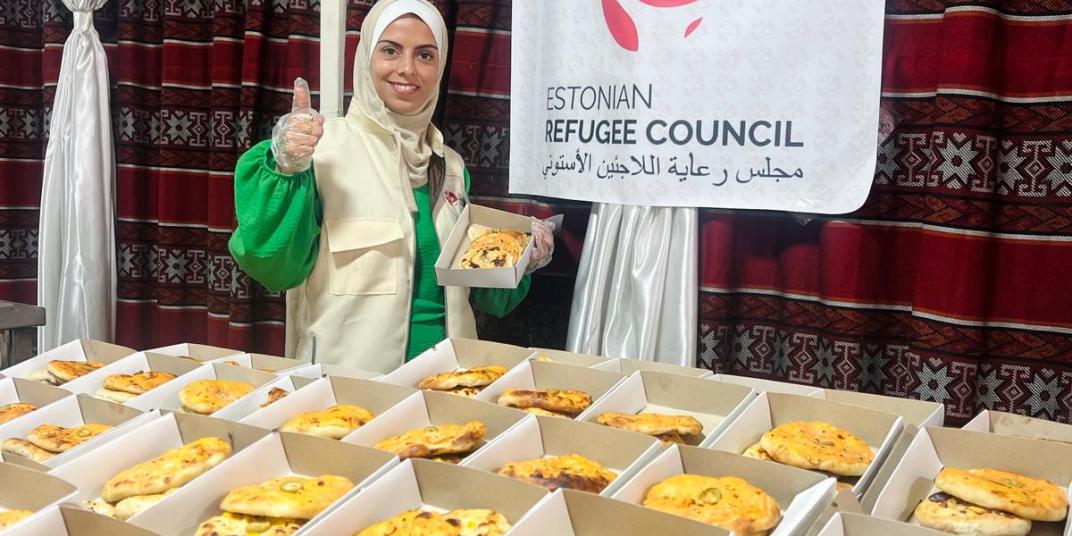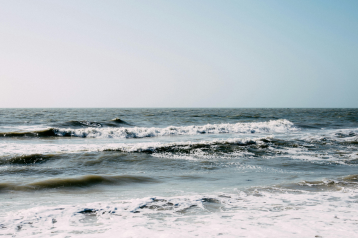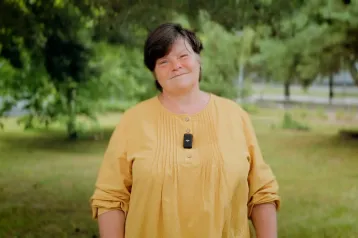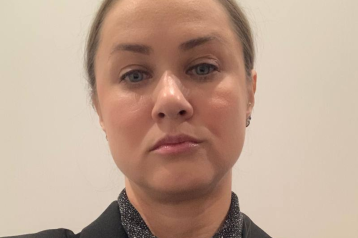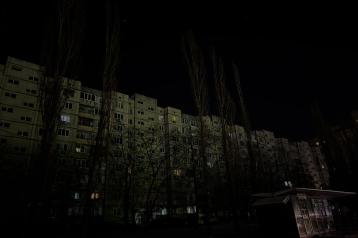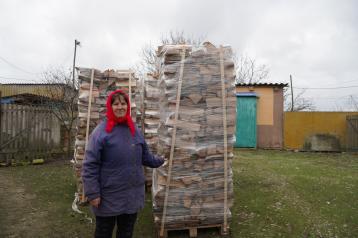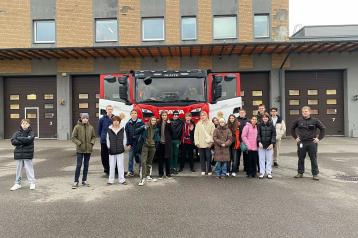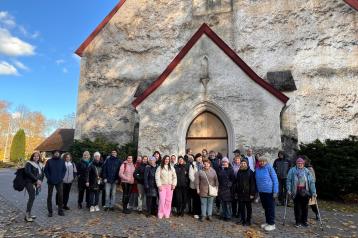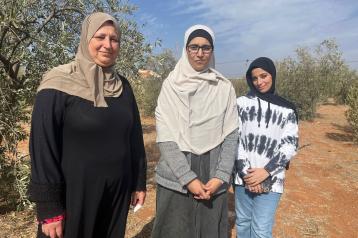Countries
We are raising donations in Estonia to ensure daily meals in two hospitals in Gaza City. With the support of Estonian donors, we can provide essential food aid that gives patients the strength to recover and supports doctors and nurses who are working under difficult conditions to save lives. Do not look away. Help break through hunger. Make a donation on the Estonian Refugee Council website.
Registration has opened in Estonia for the new season of the Start Smart training on artificial intelligence, aimed at young people aged 15–29 with a refugee background.
In Ukraine, we are launching a new entrepreneurship programme to help people affected by the full-scale war build sustainable sources of income.
In Armenia, we have set up hydroponic greenhouses to help schools cope with climate change and ensure access to food in water-scarce conditions. The greenhouses also serve to strengthen children’s knowledge of the environment.
Also in Armenia, four community councils were launched in August to help make the voices of people with refugee backgrounds better heard in standing up for their rights.
Ukraine
We provide cash assistance, which allows people affected by the war to purchase food, medicines, hygiene products, and other essentials. As of now, we have provided cash-based assistance to more than 312,000 conflict-affected people, worth nearly 58 million euros. Cash assistance is provided for three months, with the support of 3600 Ukrainian hryvnias per household member per month, equivalent to about 80 euros. Registration for assistance is carried out through Estonian Refugee Council's local registration points or via the online application platform. Currently, our focus is on assisting those in need in frontline areas in Zaporizhzhia, Donetsk, Luhansk, Kharkiv, and Kherson oblasts. The programme is supported by the European Union, the US Government, and the Estonian Ministry of Foreign Affairs. Acted is the lead partner for EU and US-supported projects.
We are supporting both new and existing businesses across five regions – Poltava, Kirovohrad, Cherkasy, Dnipro, and Kharkiv through a self-employment programme which allows people to take part in online business trainings, get mentoring support and receive business micro grants. In August, we received 306 applications. Of these, 175 participants were accepted into the training for existing businesses, while 131 joined the training for new ventures. All participants are now working on developing business plans, after which the strongest will be selected to move forward with mentorship and a grant starting in October. The project is developed in partnership with WEBPROMO and supported by the US Government.
We support livelihoods related to agriculture, livestock, food production, and various services through emergency assistance, with the aim of strengthening people’s self-reliance. The amount of support is around 700 euros. The programme is funded by the European Union, US Government, and the Ministry of Foreign Affairs of Estonia.
We provide psychosocial support via a mental health hotline for Ukrainians living both in Ukraine and abroad to support the people affected by the war. The work of the NPA Psychological Hotline is implemented in partnership with the National Psychological Association of Ukraine and made possible thanks to funding from ESTDEV – Estonian Centre for International Development.
Estonia
In August, registration opened for the Start Smart AI-focused training programme for young people, with the first sessions scheduled for the end of September. The training is part of an entrepreneurship programme delivered in collaboration with Haaga-Helia University of Applied Sciences in Finland, aimed at enhancing the competitiveness of people with a refugee background in entrepreneurship through learning about artificial intelligence. Start Smart entrepreneurship training programme is part of UPBEAT project. Project partners are Haaga-Helia University of Applied Sciences, Startup Refugees and Estonian Refugee Council. The project is co-funded by the European Union, through the Interreg Central Baltic Programme.
Through the Language Ladder programme, we support Ukrainian refugee youth in language learning and social integration. Read more on the website of the Estonian Refugee Council. The project is being implemented in collaboration with Tallinn University and the Polish organisation Dobra Fabryka. Funded by the European Union. Views and opinions expressed are however those of the author(s) only and do not necessarily reflect those of the European Union or European Social Fund Agency. Neither the European Union nor the Granting Authority can be held responsible for them.
We conduct monthly adaptation support training sessions on various subjects, including use of e-services, parenting, education system, adaptation of pensioners, legal matters, entrepreneurship, medical and social system, labour market, as well as legal foundations and residence permits. The training sessions take place across Estonia, both in face-to-face and online formats. In August, 289 people took part in training sessions. Since 2022, a total of nearly 11,800 people have participated. People with a refugee background continue to show the greatest interest in trainings that introduce various legal frameworks, including different types of residence permits that allow them to stay in Estonia and build their lives here.
We provide counselling by appointment at the Estonian Refugee Council office (Vambola 6, Tallinn) every day from 10 am to 5 pm. Our information hotline is open to all refugees, as well as institutions and individuals assisting them, at +372 5881 1311 (Monday to Friday from 10 am to 5 pm), and via email at counselling@pagulasabi.ee. Additionally, counselling services are available on Viber, WhatsApp, and Telegram at +372 5464 0007.
We organise regular group activities and community events across Estonia. In August, nearly 80 people took part in community activities across Estonia. Several community events were held to support language learning, youth engagement, and community integration. In cooperation with the Estonian Network of People Living with HIV, a seminar was held addressing the challenges and problems in resolving refugee-related issues. We also continued organising language cafés in Tallinn and held a tote bag workshop. Community activities are supported by UNHCR, the UN Refugee Agency.
We are running the MindSpring group based programme for people with refugee backgrounds to help them adjust to life in a new country. In September, the final group for parents will start. The programme is being implemented with the support of the Estonian Ecumenical Relief Organization (EERO Canada), funded by donations collected in Canada and the United States.
In cooperation with the Integration Foundation, we are launching training activities to strengthen the capacity of local governments in the fields of migration and integration. The first training will take place on 30 September in Paide, with a total of 20 trainings planned across Estonia. The project is co-funded by the European Union through the Asylum, Migration and Integration Fund (AMIF) and the Ministry of the Interior.
In cooperation with the Integration Foundation, we are launching joint activities across Estonia aimed at increasing the social engagement, trust and understanding of third-country nationals, including beneficiaries of international protection. Project no. AMIF.1.02.23-0005 “Cooperation activities to increase the civic engagement of third-country nationals, including beneficiaries of international protection” is co-funded by the Asylum, Migration and Integration Fund (AMIF).
Armenia
In Armenia, we are establishing hydroponic greenhouses at three schools in the Tavush region and supporting the adoption of water- and energy-efficient agricultural solutions. We help the schools cope with the impacts of climate change and ensure food security in water-scarce conditions. The programme also supports environmental education for children and increases student engagement with agricultural and environmental topics. Our partner is the Estonian University of Life Sciences to apply Estonia’s expertise in setting up and managing hydroponic greenhouses, composting systems, and energy-efficient agricultural practices. In August we installed three greenhouses at Sevkar, Achajur, and Koghb N2 secondary schools. The programme is funded by the Ministry of Climate of the Republic of Estonia.
Thanks to funding from the European Union, we are launching four community councils in Armenia to enable people with refugee backgrounds to voice their concerns, advocate for solutions to their problems, and take part in decision-making processes that affect them. Community councils in Yerevan, Dilijan, Gyumri, and Yeghegnadzor were launched in August and will start accepting member applications in September. Similar councils have been previously established in Estonia and Georgia. We are also running self-help groups that support the mental well-being of people with a refugee background and provide them with practical skills and support to start or restore small businesses and secure sustainable livelihoods. In August business development sessions took place in Hrazdan and Dilijan, with 15 members graduating in both locations and having the option to apply for livelihood grants. Another call for applications was opened at the end of August. 13 people from previous groups continue their journey with mentoring sessions. The programme is funded by the European Union.
Georgia
We continue strengthening local NGOs and civil society organisations in Georgia. The programme enhances their ability to address regulatory challenges, secure the funding needed for operations, and promote cooperation between different regions. The training sessions will take place in September and October.
We support Ukrainian refugees in Georgia through cash-based humanitarian assistance. Each eligible household will receive one-off support of 265 GEL (approximately 93 euros) per person, for up to three family members. The cash based humanitarian assistance will be provided to people in need in September.
Jordan
In Jordan, we support the self-reliance of vulnerable women-led households through smart and climate-friendly agricultural practices. At the same time, we are providing hydroponics training to four women-led community organisations to increase knowledge of water-efficient farming methods across the region. Forty Syrian refugee and local community women have completed agriculture-focused training, gaining essential knowledge, developing practical farming skills, and being motivated to generate their own livelihoods. We are able to provide support to 12 of these women to establish hydroponic greenhouses on their home plots. These greenhouses enable them to grow food for their families or earn an income by selling the produce. The activities of the Estonian Refugee Council in Jordan are supported by ESTDEV – Estonian Centre for International Development.
Syria
The Estonian Refugee Council is opening an office in Syria to support people affected by the civil war and help them rebuild their lives. The Refugee Council has been involved in regional support for Syria since 2018 and has also supported the long-term self-reliance of Syrian refugees in Jordan and Lebanon.
Palestine
We have begun collecting donations in Estonia to provide critical food aid to people in the Gaza Strip. In cooperation with Gaza Soup Kitchen, we are distributing food in two hospitals in Gaza City, supporting both patients receiving treatment and the medical staff who work there to save lives. Donations can be made through the Estonian Refugee Council’s donation platform. More information is available on the Estonian Refugee Council website.
